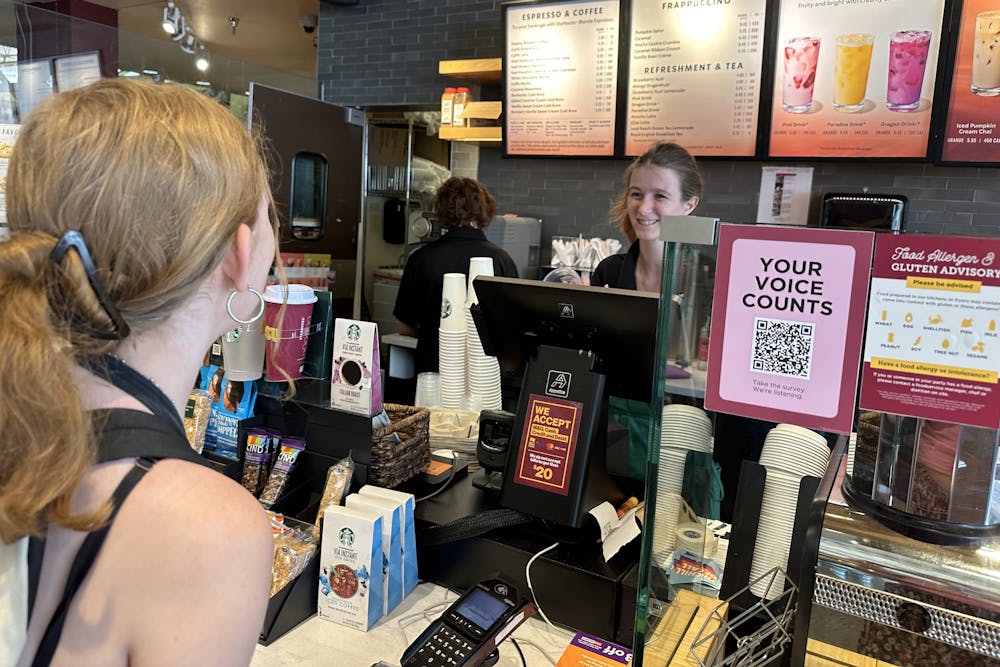As a tipped worker, Gemma Moro, a freshman studying data science, frequently heard "horrible" complaints from customers when showing them the tip screen.
Moro is now a hostess at a restaurant, but her previous jobs consisted of working at food counters, where tip screens often led to embarrassment.
"It's either you don't get a tip, you get a tip and a rude comment or you get a small tip," Moro said. "I definitely would prefer to just get that money immediately on my paycheck for my hour, rather than having to rely on that."
Moro’s concerns about tipping may increase in the upcoming November election because of Prop 138, the "Tipped Workers Protection Act," which would amend the State Constitution to allow employers of tipped workers to pay their staff up to 25% less than the minimum wage.
The measure will be applicable for all tipped workers as long as "the employer can establish that the employee is paid at least the minimum wage plus $2.00 per hour for all hours worked," according to the proposal.
To be added to the November ballot, the proposed amendment to the Arizona Constitution required a simple majority vote of the Arizona State Legislature. The Arizona House of Representatives passed the amendment on April 3, 2024, and the Arizona Senate passed it on June 12, 2024.
Arizona's current minimum wage is $14.35 per hour, making it so that currently workers get paid $11.35 per hour at the minimum before tips, as long as they are making a sum equal to the minimum wage with tips. With the proposed amendment, workers will get paid $10.77 from their employer as long as they are making $16.35 per hour with tips.
Prop 138 would make the tip credit margin larger, relieving employers from paying their tipped workers as much as they are now. The proposition then implies that the remaining difference should be made up by the consumers through their tips.
"I do think it's part of the employer's job to pay them well," said Isabella Muñoz, a freshman studying psychology. "But also if you're going to a restaurant for the service, you should still be tipping."
The Arizona Restaurant Association is the main supporter of the "Tipped Workers Protection Act" because it will help keep small businesses growing and give them a "fruitful" and "beneficial" future, according to Steve Chucri, the Arizona Restaurant Association CEO and president.
"Places just should pay their employees more in the first place," Sonya Cinnamond, a freshman studying psychology, said. "They shouldn't have to rely on other people to tip their employees."
Grace Warmenhoven, a junior studying kinesiology and a hostess at a barbecue restaurant, said that she doesn't think the public will assume responsibility for tipping because they figure the restaurant should pay the whole wage.
Kimberly Amaya, a freshman studying business, said she doesn't see tipping as a necessary transaction when at a restaurant, embodying Warmenhoven's claim. Amaya said that the action of tipping someone should be considered a gesture versus a needed source of income.
Chucri said "tip fatigue" isn't coming from the restaurant industry, but from places where tips haven't traditionally been requested such as at convenience stores at the airport.
Prop 138 was in a lawsuit with Raise the Wage Arizona for the accusation that the name of the amendment was "deceptive to the point of fraud," according to the lawsuit. Despite the lawsuit in June of 2024, the Arizona Supreme Court ruled that the measure would remain on the November ballot.
Chucri said he disputes the Raise the Wage AZ accusations. He said the intention of Prop 138 is to secure a tipping structure to help workers so that the way they currently make money is not jeopardized by "outside interests" who want to eliminate it.
Now it will be up to voters in November to decide whether the amendment will be added to the Arizona Constitution.
Edited by George Headley, Sophia Braccio and Natalia Jarrett.
Reach the reporter at ehprest1@asu.edu and follow @ellis_reports on X
Like The State Press on Facebook and follow @statepress on X.
Ellis is a sophomore studying journalism and mass communication. This is her first semester with The State Press. She has also worked at Arizona PBS and Blaze Radio.




